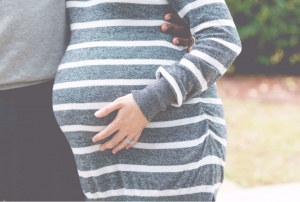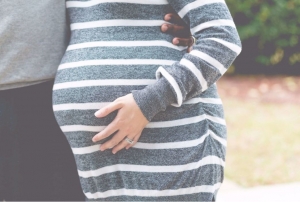Can Stress Increase Pregnancy Risks?

It’s normal for all of us to occasionally feel some amount of anxiety and stress - this can be increased when dealing with a pregnancy. Mild to moderate stress is regarded as nonthreatening and worrying about how stressed you are, can even be counterproductive. However, it’s important to recognise and understand the risks of chronic stress or stress from traumatic life changing events. This can help you take steps to deal with stress in a healthy and safe manner, reducing any risk to your health, to your baby’s wellbeing, and to the pregnancy itself.
How Stress Adversely Impacts Pregnancy Risks
Stress and Pregnancy Risks of Miscarriage
 Although there’s a need for more research, some evidence suggests that high exposure to stress during pregnancy leads to hormonal imbalances that threaten the pregnancy. The immune system may react in a hostile manner towards the fetus, attacking the placenta and possibly causing a miscarriage. While that mechanism of action is unproven, a review of studies does confirm the link between prenatal stress and increased miscarriage risk. The review found that the risk of early miscarriage doubled in expectant mothers who suffered major traumatic life events or psychological stress.
Although there’s a need for more research, some evidence suggests that high exposure to stress during pregnancy leads to hormonal imbalances that threaten the pregnancy. The immune system may react in a hostile manner towards the fetus, attacking the placenta and possibly causing a miscarriage. While that mechanism of action is unproven, a review of studies does confirm the link between prenatal stress and increased miscarriage risk. The review found that the risk of early miscarriage doubled in expectant mothers who suffered major traumatic life events or psychological stress.
Stress and Preterm or Low Birth Weight Risk
To be clear, stress is not the single greatest risk factor for preterm births, but it is significant enough to be a concern. A study that appeared in the journal BMC Pregnancy & Childbirth confirmed this link. It found that 54 % of the women, who suffered from pregnancy stress, had preterm births, while the overall rate for women was 23%. This is concerning as preterm babies face a higher risk of perinatal mortality, as well as developmental delays and learning disorders. These pregnancy risks also persist into adulthood, with preterm babies being more susceptible to chronic health disorders like heart disease and diabetes later in life.
Stress and the Risk of Infancy Sleep Disorders
Sleep isn’t just essential for health as adults. It’s also an important requirement for infants to ensure healthy growth and development. Unfortunately, chronic or high stress and depression during pregnancy can adversely impact your child’s sleep quality after birth. Research shows a clear connection, with mother’s who experience anxiety or depression during pregnancy having a 40% higher chance of having babies with sleep disorders. Experts believe that this is because of the increase in levels of the stress hormone – cortisol, which can also cross the placental barrier.
Stress and the Risk of Childhood Developmental Disorders
Preterm births are not the only outcome to threaten a child’s health years later. Prenatal stress has also been linked to developmental and mental health disorders that can surface during childhood or even in adulthood. Children may be more vulnerable to attention deficit disorder or ADHD as a result of exposure to prenatal stress, while a study in Child Development suggests a possible link to the onset of depression during adolescence. Research from 2015 also indicates that stress during the first trimester can lead to long term changes in an infant’s gut microbiota, affecting immunity and metabolism. This could be linked to a higher risk of neurodevelopmental disorders like autism and schizophrenia.
Stress and Maternal Health Risks
Prolonged exposure to high levels of stress can be detrimental to health, whether you are pregnant or not. High stress is associated with problems like hypertension and heart disease, as well as with anxiety disorders and depression. Hypertension itself increases stress on the heart and kidneys, and is linked to pregnancy complications and a higher need for Cesarean births. Similarly, mental health problems like depression can adversely affect the fetus because of increased cortisol levels, not to mention the risk of damage from unhealthy coping mechanisms. Prolonged exposure to stress can also weaken immunity, increasing vulnerability to minor infections like the common cold or sinus infections, as well infections like measles or listeria that can act as pregnancy risks.
Stress and the Risk of Postpartum Depression
The effects of chronic or severe stress from traumatic life events can extend beyond the duration of the pregnancy. If not dealt with appropriately, mental illnesses can persist beyond the delivery, adversely affecting a mother’s relationship with her baby. Women who experience emotional trauma and high levels of stress during pregnancy are also more likely to develop postpartum mood disorders. This can have a significant impact on quality of life for both you and your child. Postpartum depression is known to interfere with breastfeeding and bonding activities, in cases even increasing the risk of violence towards oneself or others.
Relaxation techniques can help cope with stress and are useful during pregnancy, whether or not you suffer from chronic stress. In most cases, stress is not something you’ll need to worry about. If it’s persistent and has a marked effect on your mood, however, don’t hesitate to ask for help.
About the Author

Shaun DMello is a prolific writer who has worked with a wide range of health and wellness brands for over a decade. His main areas of expertise are nutrition, fitness, natural medicine, public health, and health care technology.
When he’s not writing, you can find him reading a good book, curled up on a recliner, jostling for space with his four cats.



